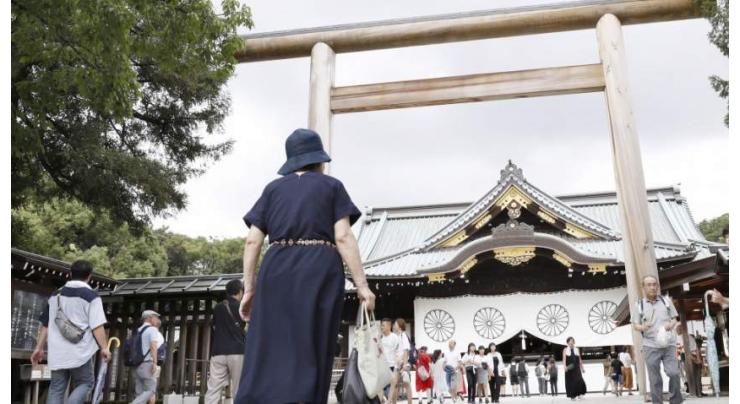
Seoul Expresses Concerns Over Japanese Authorities' Ritual Offering To War Shrine
Mohammad Ali (@ChaudhryMAli88) Published August 15, 2019 | 02:36 PM

The South Korean Foreign Ministry on Thursday voiced "deep concerns" after Japanese Prime Minister Shinzo Abe sent a ritual donation to the Yasukuni Shrine, which is regarded by Seoul as a symbol of Tokyo's imperialistic past
MOSCOW (UrduPoint News / Sputnik - 15th August, 2019) The South Korean Foreign Ministry on Thursday voiced "deep concerns" after Japanese Prime Minister Shinzo Abe sent a ritual donation to the Yasukuni Shrine, which is regarded by Seoul as a symbol of Tokyo's imperialistic past.
"The government expresses deep concerns over responsible leaders of the Japanese government and parliament sending offerings and paying respects again at the Yasukuni Shrine that glorifies Japan's past colonial plunder and war of invasion and enshrines war criminals," the ministry said in a statement, as quoted by South Korea's Yonhap news agency.
Having a conservative support base, Abe has not visited the controversial shrine in person since 2013, instead making monetary offerings as a private citizen through his aide, former Defense Minister Tomomi Inada, every year, South Korean and Japanese media reported.
Beijing and Seoul protested Abe's last visit to the shrine in 2013, calling it an effort to glorify Japan's militaristic past. The Imperial Shrine of Yasukuni, located in the Chiyoda district of Tokyo, honors 14 Class A war criminals and other fallen soldiers in Japan, according to the Yonhap news agency.
About 50 right-wing politicians from the Japanese ruling and opposition parties paid their respects at the shrine on Thursday.
The Yasukuni Shrine was founded in 1869 and commemorates about two and half million civilians and officials as well as war criminals who died for the Empire of Japan, which existed from 1868 to 1947. Regular visits of Japanese officials to the shrine have been a contentious issue in diplomatic relations between Japan and its neighbors, who suffered from the island nation's militarism.
Relations between Japan and South Korea, in particular, dampened after the latter's top court ruled that a number of Japanese companies could be sued for their use of forced labor during World War II. Japan has protested the decision, claiming that the 1965 agreement between two countries had resolved the issue of damages once and for all.
Related Topics
Recent Stories

Boeing passenger plane exits runway in Senegal injuring 11

PML-N ulema wing stresses punishment to May-9 culprits

No reprieve for perpetrators of May 9 arson attacks: PM

Punjab governor terms May 9 dark chapter in country’s history

Nadal squeezes past qualifier Bergs in Rome opener

Federal Minister for Economic Affairs, Ahad Khan Cheema chairs meeting with EDCF ..

Jinnah House attack: ATC grants bail to 7 accused

Under women empowerment plan, 1,600 lady cops recruited: IGP

All possible relief being provided to police personnel

IG Punjab provides house to family of another martyr

Commissioner Sukkur distributes gifts, flowers among thalassemia patients

Pakistan eyes green energy, technology cooperation with China in CPEC 2nd phase
More Stories From World
-

Boeing passenger plane exits runway in Senegal injuring 11
6 minutes ago -

Pakistan eyes green energy, technology cooperation with China in CPEC 2nd phase
11 minutes ago -

Charities warns Italy's ban on NGO planes risks lives
10 minutes ago -

Israel hits Rafah despite US warning on arms transfers
10 minutes ago -

Boeing plane leaves runway in Senegal injuring 11
10 minutes ago -

Israel says Biden threat to stop arms 'very disappointing'
10 minutes ago
-
Marquez eyes French MotoGP victory but plays down title talk
2 hours ago -
Football: French Ligue 1 table
2 hours ago -
Football: French Ligue 1 table
3 hours ago -
Spanish court shelves Shakira tax fraud case
3 hours ago -
North Africa football fans use stadium freedoms to back Palestinians
4 hours ago -
Rafah struck after Biden warning on arms transfers
4 hours ago





